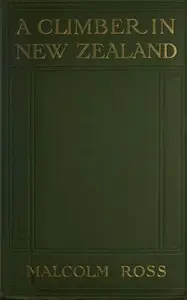"A Climber in New Zealand" by Malcolm Ross is a mountaineering memoir written in the early 20th century. This work chronicles the author’s adventurous journeys and explorations in the Southern Alps of New Zealand, reflecting on both the challenges and breathtaking beauty of the mountainous landscapes. Ross describes his own experiences and those of other climbers, especially noting the significance of local peaks like Mount Cook. At the start of the memoir, the author introduces the reader to the Southern Alps, emphasizing their grandeur and the lack of familiarity many have with New Zealand's climbing potential. He shares anecdotes about early explorers and climbers, particularly the Rev. William Spotswood Green's near-attempt at scaling Mount Cook, and describes the natural beauty of the region, including its flora, fauna, and glaciers. Ross paints a vivid picture of both the physical and psychological demands of alpine climbing, evoking a sense of adventure while laying the groundwork for the personal experiences that will unfold in the chapters ahead. (This is an automatically generated summary.)

A climber in New Zealand
By Malcolm Ross
Illustrated from photographs by the author.
Malcolm Ross was a New Zealand journalist, mountain climber, and a war correspondent during the First World War. Born in Otago, he was employed by the Otago Daily Times from 1882 until 1889, when he began working for the Union Steam Ship Company. He resumed his career as a fulltime journalist in 1897, relocating to Wellington to report on parliamentary matters. Following the outbreak of the First World War, he went to German Samoa to cover its seizure by the New Zealand Military Forces. He was selected as the official war correspondent for New Zealand, reporting on the exploits of the New Zealand Expeditionary Force at Gallipoli and in Europe. His dispatches were criticised for their boring style and lack of timeliness although the latter was mainly as a consequence of constraints placed on him by the New Zealand Government. After the war he resumed his career as a member of the press gallery covering parliament until his retirement in 1926.













